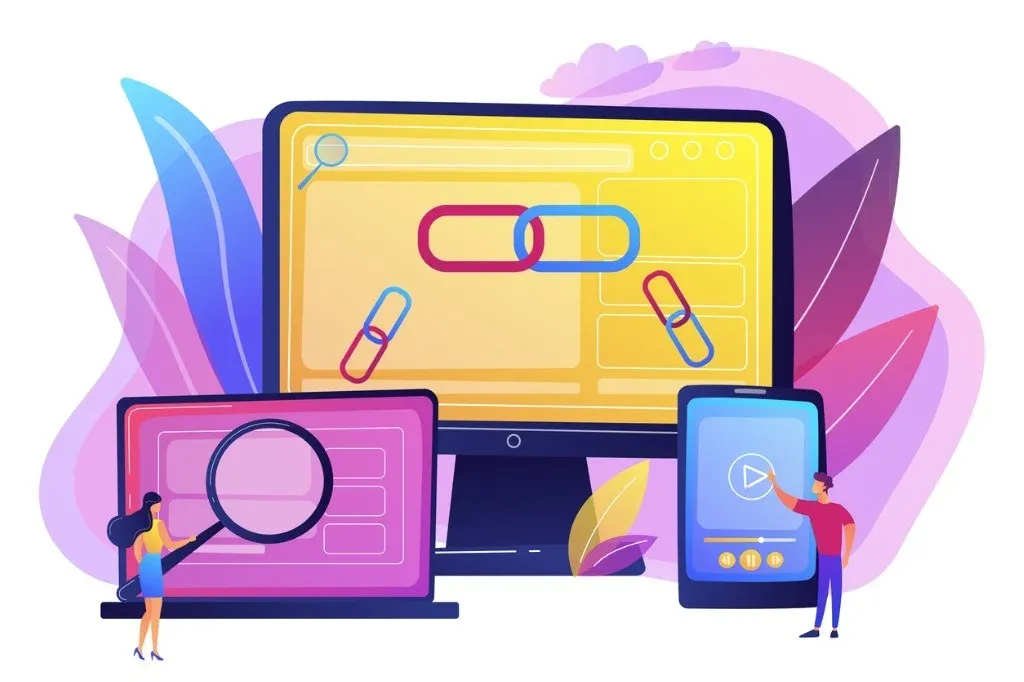Maximize Your Impact: The Profound Benefits Of Internal Linking In SEO

You could make your website so full of connections and life that Google's algorithms would bow down in awe.
Linking to other pages on your own site is a secret SEO trick that boosts your site's ranking and makes your content better. It's not just a technical concept; it's about making the web interesting, taking users on journeys of discovery, and employing effective internal linking practices to make your website the most reliable source.
Are you ready to discover these hidden benefits of internal linking? Learn all about how strong internal links are, and your SEO will go through the roof!
Are Internal Links Good for SEO?
By making a website's content web, internal links help its SEO results. They also make search engines work better and make the user experience better. Contrary to what most people think, internal links are good for SEO in a number of ways.
Using internal links in a smart way can help a website's SEO. These links help search engine bots figure out the order of pages and what they are about, contributing to effective internal linking strategies for SEO. This makes SERP indexing and exposure better.
Many misunderstandings happen because people don't know how useful internal links can be. Some people believe that links to other sites are more important than links to you. Understanding and implementing effective internal linking practices can significantly enhance your website's SEO and user experience.
Links inside and outside the company have different purposes and are not competing with each other. Internal links are an important part of a good SEO plan because they help build content hierarchy, spread page authority, and get people more involved with your site.
Internal links are very important for SEO because they help search engines and users find information more easily. To understand the SEO benefits of internal links, it's important to bust some myths about them, including exploring the significant internal linking advantages they bring to your website's visibility and user experience.
Why Are Internal Links Important For SEO?

There are basic reasons why internal links are so important to SEO. They help people easily move around a website, leading them to the right material and making the whole experience better for everyone. There is a link between well-structured internal linking and better SEO performance, which is supported by statistics. Here’s why the internal linking impact on search rankings can significantly enhance your website's visibility and overall search engine optimization.
Improved Website Navigation
Internal links make it easy to find your way around a website by acting as navigational markers. They improve the general accessibility of a website by using descriptive anchor text to lead users to relevant content, thereby optimizing SEO with the advantages of internal connections and making navigation easier and more seamless.
Enhanced User Engagement
Relevant internal links keep users interested in the content, which lowers the number of "bounces" and encourages longer-term involvement. The link between user engagement and SEO success shows how important it is to have internal links that work well together to give users a dynamic experience.
Distributing Page Authority
One important SEO strategy is to use internal links to spread page authority in a smart way. By strategically linking to high-authority pages, the site's total authority is raised. An even distribution of page authority is very important for a website's SEO, and understanding the SEO benefits of internal links can significantly enhance your site's performance in search engine rankings.
Content Discoverability
Within-page links are very important for helping search engines find and list new material. Websites can improve their chances of ranking higher in search results by making their information more visible through internal links.
Establishing Content Hierarchy
Structured content order, which is a key part of good SEO, is made possible by internal links. Setting up a linking hierarchy and figuring out which pages are the most important makes sure that search engines know how important each page is, providing significant SEO advantages of internal connections for the website's overall optimization.
Keyword Relevance And Anchor Text

To improve keyword relevance, it's important to use appropriate anchor text for internal links. The general SEO strategy is improved by using anchor text correctly, which stresses how important it is to pick anchor text that matches the targeted keywords and understand the internal linking advantages it brings to your website's overall performance.
Consistently capturing these benefits across a large content library requires internal linking tools built for scale that remove the manual bottleneck — automatically surfacing linking opportunities and implementing them across hundreds of published pages.
Reduced Orphaned Pages
Pages that are "orphaned" and don't have any internal links hurt SEO. Comprehensive internal linking keeps pages from being left out, which lowers the number of "orphaned" pages and emphasizes the importance of internal links in SEO by keeping the structure of the website consistent.
Expert Picks: SEO Internal Linking Strategy In 2023
This section talks about how important it is to have a plan that is up-to-date and based on current SEO trends, including effective internal linking strategies for SEO.
Content Audit And Mapping
For SEO, you should do a content audit to find content clusters and pages that are related. With a good internal linking strategy and a thorough content assessment, optimizing SEO with internal links ensures that digital material will be consistent and useful.
Linking Hierarchy And Priority Pages
Add a linking structure to draw attention to important pages. These pages are important for SEO and should be part of a strong internal linking plan to enjoy the benefits of strategic internal linking.
Dynamic Vs. Static Internal Links
When we look at dynamic and static internal connections, we pay attention to balance. Check out these dynamic link examples that show how a good mix can help you make an effective and varied internal linking strategy.
Anchor Text Optimization
The anchor text for internal links should be varied and detailed. Showing how well-written anchor text improves SEO, user experience, and search engine visibility is a more advanced method that is encouraged, emphasizing the internal linking impact on search rankings.
Contextual Linking
Contextual linking lets you enjoy seamless interaction. It makes internal links part of the text, which improves the user experience and makes the content more relevant. Real-life examples show how contextual linking makes the most of the synergy between information.
Page Load Speed Optimization
It is very important to know about SEO and how fast the page loads. Improve the quality of images and videos on your website to make it load faster. This will show search engines that your site loads quickly and that your customers are happy.
Mobile-First Internal Linking
Focus on internal links that work well on mobile devices in a world where mobile is the first medium of communication. Fixing these links will make the mobile experience better and show how mobile-first internal linking has a big effect on SEO.
Best SEO Internal Linking With LinkBot

Linkbot is here to help you with internal linking for SEO all the way through the process. Because it automates internal connections, this program completely changes the game. This makes things run more easily and helps everyone the most. It's easy to add Linkbot to your process as you learn more about its features and how they can change the way you do internal linking. Use the tool that helps you connect with people inside your business more easily and better to take your SEO plan to the next level, exploring the profound impact of internal linking on search rankings.
Elevate Your SEO Journey With Linkbot's Internal Linking!
Since SEO is always changing, 2023 calls for smart ways to handle internal links. From content checks to mobile-first ideas, this help from experts shows you internal linking strategies for SEO and how to do well.
Tools like Linkbot can change things as you change how you do things. This tool, which is all about making internal links, works great with the ideas that were shared. It will help your SEO in the long run, and every link will be an important part of the internal linking advantages in how many people see your website online.
FAQs About Internal Linking Benefits
Are Internal Links Only Beneficial for Large Websites, or Can Small Websites Benefit Too?
Internal linking benefits websites of all sizes. It improves navigation and enhances the user experience, positively impacting internal linking and search rankings for both small and large sites.
Can Too Many Internal Links Be Harmful to SEO?
While internal linking is beneficial, an excessive number of links on a page can dilute their impact. It's crucial to maintain balance and focus on relevance for optimal results, emphasizing the benefits of strategic internal linking.
How Often Should I Update My Internal Linking Strategy for Maximum Effectiveness?
Regular updates are essential. Reassess your internal linking strategy during content updates or site changes to understand the importance of internal links in SEO. Dynamic strategies adapt to evolving content and SEO trends.
Are There Specific Industries or Niches That Benefit More From Internal Linking?
Internal linking is universally beneficial, but its impact may vary based on content structure. E-commerce sites, blogs, and news websites often see significant gains from strategic internal linking for a better user experience.